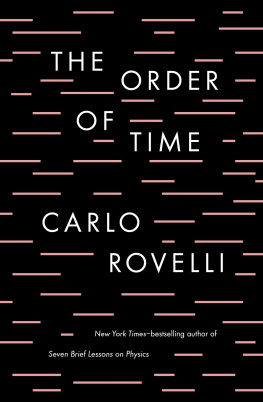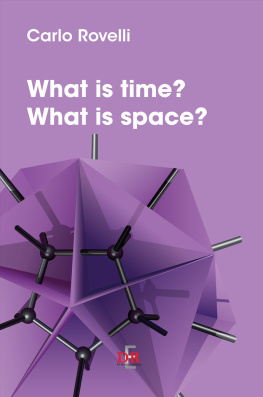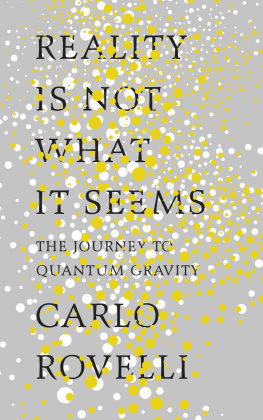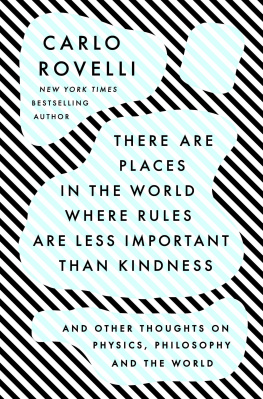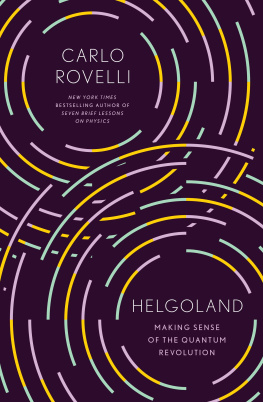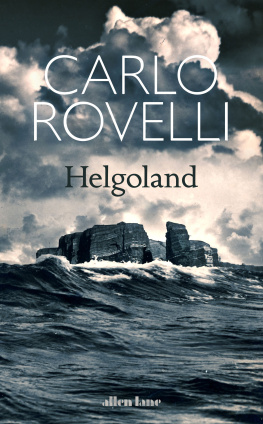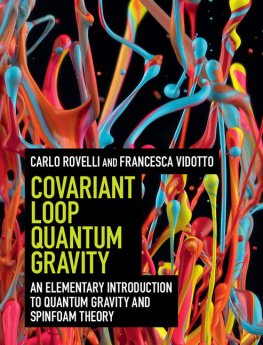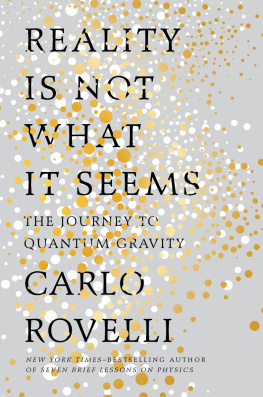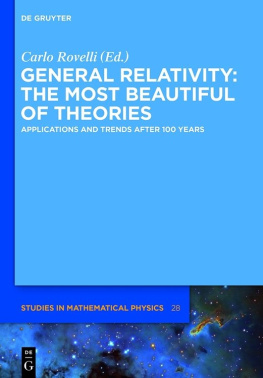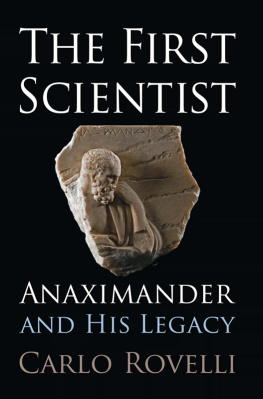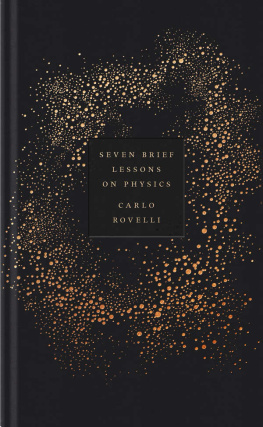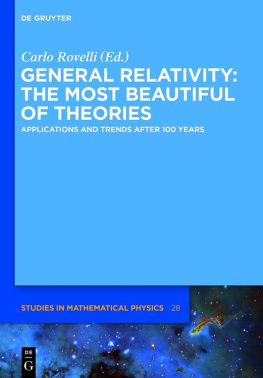
RIVERHEAD BOOKS
An imprint of Penguin Random House LLC
375 Hudson Street
New York, New York 10014

Published by Riverhead Books 2018
Copyright 2017 by Adelphi Edizioni SPA, Milano
Translation copyright 2018 by Simon Carnell and Erica Segre
First published in Italy by Adelphi Edizioni SPA under the title Lordine del tempo 2017
English translation published simultaneously in Great Britain by Allen Lane, an imprint of Penguin Random House UK and in the United States of America by Riverhead Books, an imprint of Penguin Random House LLC
Penguin supports copyright. Copyright fuels creativity, encourages diverse voices, promotes free speech, and creates a vibrant culture. Thank you for buying an authorized edition of this book and for complying with copyright laws by not reproducing, scanning, or distributing any part of it in any form without permission. You are supporting writers and allowing Penguin to continue to publish books for every reader.
Library of Congress Cataloging-in-Publication Data
Names: Rovelli, Carlo, author. | Segre, Erica, translator. | Carnell, Simon, translator.
Title: The order of time / Carlo Rovelli ; translated by Erica Segre and Simon Carnell.
Other titles: Ordine del tempo. English
Description: First American edition. | New York : Riverhead Books, 2018. | Originally published in Italian: Lordine del tempo (Milan: Adelphi Edizioni, 2017). | Includes bibliographical references and index.
Identifiers: LCCN 2017060293 | ISBN 9780735216105 (hardcover) | ISBN 9780735216129 (ebook)
Subjects: LCSH: Space and time. | Time. | Presentism (Philosophy). | Cosmology.
Classification: LCC QC173.59.S65 R6813 2018 | DDC 530.11dc23
LC record available at https://lccn.loc.gov/2017060293
p. cm.
Version_1
FOR ERNESTO, BILO, AND EDOARDO
CONTENTS
The verses that open each chapter, unless otherwise indicated, are from versions of Horaces Odes translated by Giulio Galetto and published in a charming small volume entitled In questo breve cerchio (Verona: Edizioni del Paniere, 1980); English translations by Erica Segre and Simon Carnell.
PERHAPS TIME IS THE GREATEST MYSTERY
Even the words that we are speaking now
thieving time
has stolen away,
and nothing can return. (I, 11)
I stop and do nothing. Nothing happens. I am thinking about nothing. I listen to the passing of time.
This is time, familiar and intimate. We are taken by it. The rush of seconds, hours, years that hurls us toward life then drags us toward nothingness.... We inhabit time as fish live in water. Our being is being in time. Its solemn music nurtures us, opens the world to us, troubles us, frightens and lulls us. The universe unfolds into the future, dragged by time, and exists according to the order of time.
In Hindu mythology, the river of the cosmos is portrayed with the sacred image of Shiva dancing: his dance supports the coursing of the universe; it is itself the flowing of time. What could be more universal and obvious than this flowing?
And yet things are somewhat more complicated than this. Reality is often very different from what it seems. The Earth appears to be flat but is in fact spherical. The sun seems to revolve in the sky when it is really we who are spinning. Neither is the structure of time what it seems to be: it is different from this uniform, universal flowing. I discovered this, to my utter astonishment, in the physics books I read as a university student: time works quite differently from the way it seems to.
In those same books I also discovered that we still dont know how time actually works. The nature of time is perhaps the greatest remaining mystery. Curious threads connect it to those other great open mysteries: the nature of mind, the origin of the universe, the fate of black holes, the very functioning of life on Earth. Something essential continues to draw us back to the nature of time.
Wonder is the source of our desire for knowledge, and the discovery that time is not what we thought it was opens up a thousand questions. The nature of time has been at the center of my lifes work in theoretical physics. In the following pages, I give an account of what we have understood about time and the paths that are being followed in our search to understand it better, as well as an account of what we have yet to understand and what it seems to me that we are just beginning to glimpse.
Why do we remember the past and not the future? Do we exist in time, or does time exist in us? What does it really mean to say that time passes? What ties time to our nature as persons, to our subjectivity?
What am I listening to when I listen to the passing of time?
This book is divided into three unequal parts. In the first, I summarize what modern physics has understood about time. It is like holding a snowflake in your hands: gradually, as you study it, it melts between your fingers and vanishes. We conventionally think of time as something simple and fundamental that flows uniformly, independently from everything else, from the past to the future, measured by clocks and watches. In the course of time, the events of the universe succeed each other in an orderly way: pasts, presents, futures. The past is fixed, the future open.... And yet all of this has turned out to be false.
One after another, the characteristic features of time have proved to be approximations, mistakes determined by our perspective, just like the flatness of the Earth or the revolving of the sun. The growth of our knowledge has led to a slow disintegration of our notion of time. What we call time is a complex collection of structures, of layers. Under increasing scrutiny, in ever greater depth, time has lost layers one after another, piece by piece. The first part of this book gives an account of this crumbling of time.
The second part describes what we have been left with: an empty, windswept landscape almost devoid of all trace of temporality. A strange, alien world that is nevertheless still the one to which we belong. It is like arriving in the high mountains, where there is nothing but snow, rocks, and sky. Or like it must have been for Armstrong and Aldrin when venturing onto the motionless sand of the moon. A world stripped to its essence, glittering with an arid and troubling beauty. The physics on which I workquantum gravityis an attempt to understand and lend coherent meaning to this extreme and beautiful landscape. To the world without time.
The third part of the book is the most difficult, but also the most vital and the one that most closely involves us. In a world without time, there must still be something that gives rise to the time that we are accustomed to, with its order, with its past that is different from the future, with its smooth flowing. Somehow, our time must emerge around us, at least for us and at our scale.
This is the return journey, back toward the time lost in the first part of the book when pursuing the elementary grammar of the world. As in a crime novel, we are now going in search of a guilty party: the culprit who has created time. One by one, we discover the constituent parts of the time that is familiar to usnot, now, as elementary structures of reality, but rather as useful approximations for the clumsy and bungling mortal creatures we are: aspects of our perspective, and aspects, too, perhaps, that are decisive in determining what we are. Because the mystery of time is ultimately, perhaps, more about ourselves than about the cosmos. Perhaps, as in the first and greatest of all detective novels, Sophocles

